
Oh hell or contract whist is a trick-taking card game of British origin in which the object is to take exactly the number of tricks bid. It was first described by B. C. Westall around 1930 and originally called oh! well. It was said to have been introduced into America via the New York clubs in 1931. Phillips and Westall describe it as "one of the best round games".

Whist is a classic English trick-taking card game which was widely played in the 18th and 19th centuries. Although the rules are simple, there is scope for strategic play.
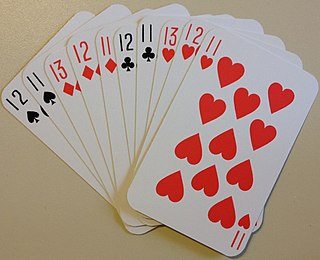
500 or Five Hundred is a trick-taking game developed in the United States from Euchre. Euchre was extended to a 10 card game with bidding and a Misère contract similar to Russian Preference, producing a cutthroat three-player game like Preference and a four-player game played in partnerships like Whist which is the most popular modern form, although with special packs it can be played by up to six players.

Euchre or eucre is a trick-taking card game commonly played in Australia, Canada, Great Britain, New Zealand, and the Midwestern United States. It is played with a deck of 24, 25, 28, or 32 standard playing cards. There are normally four players, two on each team, although there are variations for two to nine players.

Solo whist is the English form of Wiezen, a simple game of the Boston family played in the Low Countries. It is a trick-taking card game for four players in which players can bid to make eight tricks in trumps with any partner, or a solo contract playing against the other three players. Thus it combines both partnership and cut-throat play. Scoring is with small stakes won or paid out on each hand.

Preferans or Russian Preference is a 10-card plain-trick game with bidding, played by three or four players with a 32-card Piquet deck. It is a sophisticated variant of the Austrian game Préférence, which in turn descends from Spanish Ombre and French Boston. It is renowned in the card game world for its many complicated rules and insistence on strategical approaches.
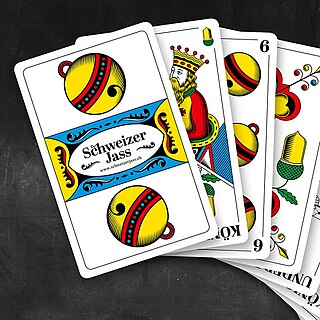
Jass is a family of trick taking, ace–ten card games and, in its key forms, a distinctive branch of the marriage family. It is popular in its native Switzerland as well as the rest of the Alemannic German-speaking area of Europe, Italian South Tyrol and in a few places in Wisconsin, Ohio, California, Oregon and Washington USA.

Twenty-five is the Irish national card game, which also underlies the Canadian game of Forty-fives. Charles Cotton describes its ancestor in 1674 as "Five Cards", and gives the nickname five fingers to the Five of Trumps extracted from the fact that the Irish word cúig means both 'five' and 'trick'. It is supposed to be of great antiquity, and widely believed to have originated in Ireland, although "its venerable ancestor", Maw, of which James I of England was very fond, is a Scottish game.
Cinch, also known as Double Pedro or High Five, is an American trick-taking card game of the all fours family derived from Auction Pitch via Pedro. Developed in Denver, Colorado in the 1880s, it was soon regarded as the most important member of the all fours family in the USA, but went out of fashion with the rise of Auction Bridge. The game is primarily played by 4 players in fixed partnerships, but can also be played by 2–6 individual players.
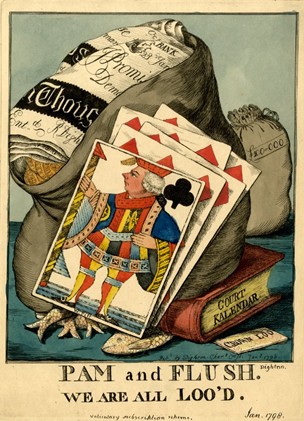
Lanterloo or loo is a 17th-century trick taking game of the trump family of which many varieties are recorded. It belongs to a line of card games whose members include Nap, euchre, rams, hombre, and maw. It is considered a modification of the game of "all fours", another English game possibly of Dutch origin, in which the players replenish their hands after each round by drawing each fresh new cards from the pack.

Bostogné, Boston or Boston Whist is an 18th-century trick-taking card game played throughout the Western world apart from Britain, forming an evolutionary link between Hombre and Solo Whist. Apparently named after a key location in the American War of Independence, it is probably a French game which was devised in France in the 1770s, combining the 52-card pack and logical ranking system of partnership Whist with a range of solo and alliance bids borrowed from Quadrille. Other lines of descent and hybridization produced the games of Twenty-five, Préférence and Skat. Its most common form is known as Boston de Fontainebleau or French Boston.
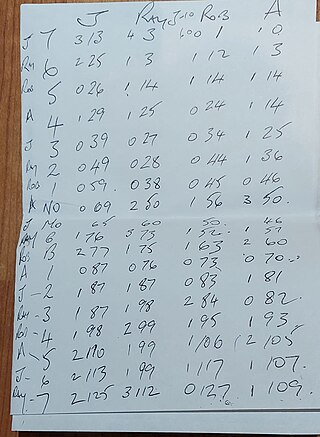
Clag is a trick-taking card game using a standard pack of 52 French-suited playing cards. It is similar to oh hell, and can be played by three to seven players. Clag originated in the Royal Air Force and started as an acronym for Clouds Low Aircraft Grounded.

The following is a glossary of terms used in card games. Besides the terms listed here, there are thousands of common and uncommon slang terms. Terms in this glossary should not be game-specific, but apply to a wide range of card games played with non-proprietary packs. It should not include terms solely related to casino or banking games. For glossaries that relate primarily to one game or family of similar games, see Game-specific glossaries.

Tippen, also known as Dreiblatt, Dreikart, Drei Karten, Dreekort, Kleinpréférence or Labet, is an historical German 3-card, plain-trick game which was popular as a gambling game for three or more players. The Danish version of the game was known as Trekort and more elaborate Swedish variants include Knack and Köpknack. It appears to be related to the English game of Three-Card Loo. It was banned as a gambling game in some places.
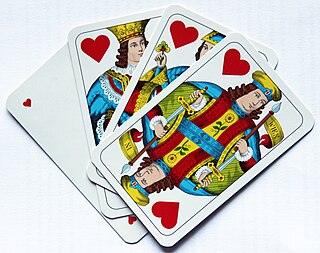
Préférence, frequently spelt Preference, is a Central and Eastern European 10-card plain-trick game with bidding, played by three players with a 32-card Piquet deck, and probably originating in early 19th century Austria, becoming the second most popular game in Vienna by 1980. It also took off in Russia where it was played by the higher echelons of society, the regional variant known as Preferans being still very popular in that country, while other variants are played from Lithuania to Greece.

Chratze is a trick taking card game, mainly played in the German-speaking part of Switzerland as well as in Bavaria. It is one of over 70 variants of Jass and played with a pack of 36 cards, either a Swiss-German or French one. It appears to be related to the Austrian game, Kratzen.
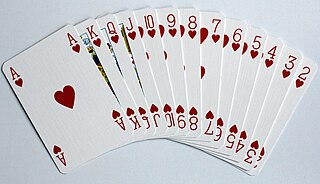
Frog, sometimes called solo sixty, is a trick-taking, card game for 3 players that is or was popular in southern USA and Mexico. It is a member of the German Tarok group of games that originate from an attempt to play the tarot card game of Grosstarock with non-tarot cards.
Ramscheln, also called Ramsch, is a German card game for three to five players, which is usually played for small stakes. It is a variant of Mönch and a member of the Rams group of card games characterised by allowing players to drop out of the current game if they think they will be unable to win any tricks or a minimum number of tricks. It should not be confused with Ramsch, an unofficial contract in Skat, played when everyone passes, in which the aim is not to score the most card points.
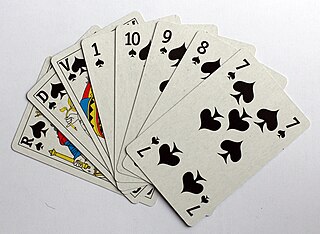
Bête, la Bête, Beste or la Beste, originally known as Homme or l'Homme, was an old, French, trick-taking card game, usually for three to five players. It was a derivative of Triomphe created by introducing the concept of bidding. Its earlier name gives away its descent from the 16th-century Spanish game of Ombre. It is the "earliest recorded multi-player version of Triomphe".

Six-bid solo, six bid solo or just six-bid for short, is a trick-taking, card game from the western United States for 3 players and is often associated with Salt Lake City. It is a member of the German Tarok group of games that originated in an attempt to play a tarot card game with standard, non-tarot cards. Six-bid solo itself is a variant of frog, a game very similar to south German Tapp, the Swabian version of German Tarok.
















